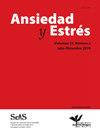Health Anxiety in the Early Phase of COVID-19 Outbreak in Turkey: Investigation of Predictive Variables
IF 0.5
Q4 PSYCHOLOGY, CLINICAL
引用次数: 1
Abstract
Objective: Health anxiety can be a risk factor for mental health and well-being. People can experience higher levels of health anxiety during pandemic outbreaks because such pandemic outbreaks can cause additional stress and threats. In this sense, people can be more vulnerable to health anxiety during the COVID-19 outbreak. To better understand and overcome health anxiety, it is important to examine factors that affect health anxiety during the COVID-19 outbreak. This study aimed to examine the effects of age, gender, perceived risk, exposure to media, depression, anxiety, and stress on health anxiety during the early phase of the COVID-19 outbreak in Turkey.Materials and Method: The participants included 1473 adults and the data were collected via an online tool. The demographic questions, the Depression Anxiety Stress Scale, and the Short Health Anxiety Scale were used to collect data. Multiple linear regression analysis was implemented to analyze the data using R program. Results: The results showed that anxiety was the strongest positive predictor of health anxiety, following stress, TV News and social media, depression, and risk perception. Age and gender were not found to be significant predictors.Conclusions: This study showed that the significant predictors of health anxiety can escalate health anxiety during the COVID-19 outbreak. The results and limitations are discussed along with implications for future research and intervention and prevention planning. © 2021 Sociedad Española para el Estudio de la Ansiedad y el Estrés - SEAS. Colegio de la Psicología de Madrid. Todos los derechos reservados.土耳其COVID-19爆发早期的健康焦虑:预测变量的调查
目的:健康焦虑可能是心理健康和幸福的一个风险因素。在大流行暴发期间,人们可能会经历更高程度的健康焦虑,因为这种大流行暴发可能造成额外的压力和威胁。从这个意义上说,在COVID-19爆发期间,人们可能更容易受到健康焦虑的影响。为了更好地了解和克服健康焦虑,研究COVID-19疫情期间影响健康焦虑的因素非常重要。本研究旨在研究年龄、性别、感知风险、媒体接触、抑郁、焦虑和压力对土耳其COVID-19爆发早期健康焦虑的影响。资料与方法:1473名成人参与,数据通过在线工具收集。采用人口统计学问题、抑郁焦虑压力量表和短期健康焦虑量表收集数据。采用R程序对数据进行多元线性回归分析。结果:结果显示,焦虑是健康焦虑的最强正向预测因子,其次是压力、电视新闻和社交媒体、抑郁和风险感知。年龄和性别并不是显著的预测因素。结论:本研究表明,在新冠肺炎疫情期间,健康焦虑的显著预测因子可能会加剧健康焦虑。讨论了结果和局限性,以及对未来研究和干预和预防计划的影响。©2021 Sociedad Española para el Estudio de la Ansiedad y el estr - SEAS。马德里学院Psicología。Todos los derechos reservados。
本文章由计算机程序翻译,如有差异,请以英文原文为准。
求助全文
约1分钟内获得全文
求助全文

 求助内容:
求助内容: 应助结果提醒方式:
应助结果提醒方式:


